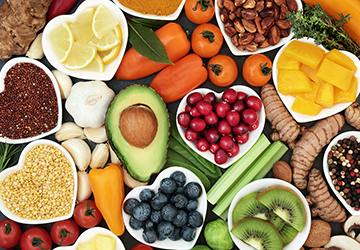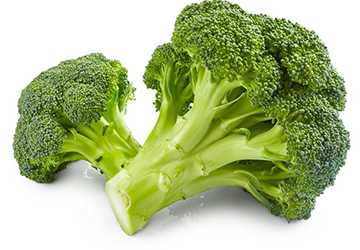Top 10 Superfoods for a Healthier You: Incorporating Nutrient-Rich Choices into Your Diet
The role of nutrition in the search for optimal health cannot be overstated. Eating various nutrient-dense foods is essential to a balanced and healthy diet. Certain foods are trustworthy sources of nutrients and are often called "superfoods." These superfoods are rich in vitamins, minerals, antioxidants and other essential nutrients and offer many health benefits. In this guide, we explore 10 of the best superfoods to help you become healthier and discuss practical ways to incorporate them into your daily diet.

1. Berries:
Berries like blueberries, strawberries, and raspberries are rich in antioxidants, including flavonoids and anthocyanins. These compounds have been linked to improved cognitive function, reduced inflammation, and lower risk of chronic disease. Add a handful of berries to your breakfast yoghurt, oatmeal, or smoothie for flavour and nutrition.
2. Avocado:
Avocado is a nutrient-dense fruit containing healthy monounsaturated fats, vitamins and minerals. It is an excellent source of potassium, which supports heart health, and contains folate essential for cell repair and regeneration. Add avocado slices to salads and sandwiches, or enjoy as a spread on whole-wheat toast.
3. Salmon:
Salmon is a fatty fish rich in omega-3 fatty acids, known for its ability to strengthen your heart. Omega-3 fatty acids support cardiovascular health, reduce inflammation, and support brain function. Grill or bake salmon for a delicious, protein-packed main dish, or add it to salads and wraps for a nutritional boost.
4. Leafy vegetables:
Dark, leafy green vegetables like spinach, kale, and chard are highly nutritious. These green vegetables are rich in vitamins A, C, and K and folate and iron, which support immune function, bone health, and overall health. Add leafy greens to salads and smoothies, or stir-fry them as a side dish for a boost of nutrition.
5. Quinoa:
Quinoa is a versatile and nutrient-dense whole grain that is a complete source of protein, making it an excellent choice for vegetarians and vegans. It is rich in fibre, vitamins and minerals. Use quinoa as a base for salads and stir-fries or a side dish for various meals.
6. Nuts and seeds:
Nuts and seeds like almonds, walnuts, chia seeds and flaxseeds are rich in essential nutrients, including healthy fats, protein and fibre. These foods support heart health, support weight management, and provide sustainable energy. Eat nuts or seeds, sprinkle them on yoghurt, or blend them into smoothies and salads.
7. Greek yogurt:
Greek yoghurt is a nutrient-dense dairy product rich in protein, calcium and probiotics. Probiotics promote a healthy gut microbiome, improving digestive health and overall health. Enjoy Greek yoghurt as a snack, add it to smoothies, or use it as a base for creamy dressings and dips.
8. Turmeric:
Turmeric is a spice with anti-inflammatory and antioxidant properties that contains curcumin, a bioactive compound. Curcumin has various benefits, including reducing inflammation, improving joint health, and potential anti-cancer properties. For flavour and health, you can add turmeric to soups, stews, curries, or golden milk.
9. Sweet potato:
Sweet potatoes are a nutrient-dense root vegetable packed with vitamins, minerals and fibre. They contain high levels of beta-carotene, an antioxidant converted to vitamin A, in the body to support eye health. Roast, puree, or bake sweet potatoes for a nutritious and colourful side dish.
10. Broccoli:
Broccoli is a cruciferous vegetable rich in vitamins C and K, folate and fibre. It contains sulforaphane, a compound with potential anti-cancer properties. Add broccoli to salads and stir-fries, or enjoy it as a side dish by steaming or frying.

Incorporate superfoods into your diet:
Although the list of superfoods is extensive, it's important to ensure variety and balance in your diet. Here are some helpful tips on how to incorporate these superfoods into your daily meals:
Make a Colorful Salad: Combine leafy greens, berries, avocado, and nuts for a vibrant and nutritious salad.
Blend Superfood Smoothies: Blend superfoods like berries, Greek yoghurt, and chia seeds into a delicious and nutritious smoothie.
Make Quinoa Bowls: Mix healthy bowls with veggies, salmon, or nuts for a nutritious and satisfying meal.
Smart Snacks: Mix nuts, seeds and dried berries for a convenient and healthy snack.
Incorporate turmeric into cooking: Add turmeric to your spice collection and use it in various dishes, such as curries, soups, or roasted vegetables.
Swap Regular Potatoes for Sweet Potatoes: Substitute sweet potatoes for regular potatoes in recipes to increase nutritional value.
Experiment with leafy greens: Explore different dark leafy greens in your kitchen, from spinach to kale, to benefit from different nutrients.
Choose whole grains: Choose whole grains like quinoa instead of refined grains to increase fibre and nutrients.
Incorporate salmon into weekly meals: Plan to include salmon in regular meals, whether grilled, baked or added to salads, to reap the benefits of omega-3s.
Yogurt Parfait: Make a delicious yoghurt parfait with Greek yoghurt, berries, and a handful of nuts for a balanced and satisfying breakfast or dessert.
Remember: The key to a healthy, balanced diet is variety. While these superfoods have many health benefits, eating various nutrient-dense foods is vital to ensure you get a range of essential vitamins and minerals.
Conclusion:
Incorporating superfoods into your diet is a positive step towards promoting overall health. By eating a variety of nutrient-dense foods, you can provide your body with the necessary building blocks to function optimally. Whether adding leafy greens to a salad, enjoying a quinoa bowl, or savouring rich salmon, each superfood has its unique nutritional profile. Incorporate these healthy choices into your meals, and you'll be on your way to a healthier, more active lifestyle.


